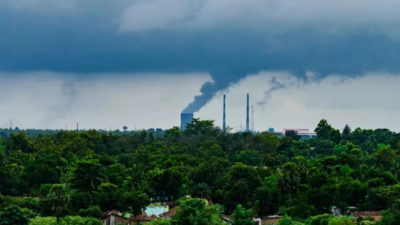BATHINDA: The India Forum for Nature-based Solutions ( NbS ) held its inaugural annual summit on Tuesday. Launched in 2022, this forum with partners - Council on Energy, Environment and Water, GIZ India, India Climate Collaborative, NIUA Climate Centre for Cities, The Nature Conservancy, Wetlands International South Asia, WWF India, and WRI India is a coalition of research, practice and finance organizations working to shape climate resilient cities and communities in India. Ms Debashree Mukherjee, secretary, ministry of Jal Shakti, pointed out the need to broaden the scope for managing climate risks.
She said, “Flood management is not just about stormwater management but also about managing water bodies and groundwater recharge potential, as well as steering knowledge among multiple stakeholders.” One of the key highlights of the Summit was recognizing individuals and organizations involved in furthering NbS interventions across India. Rahul Kapoor, Joint Secretary, Ministry of Housing and Urban Affairs, Government of India, said, "The challenges for NbS implementation are similar to the challenges experienced across sectors.

There's a need to look at the existing regulatory and institutional frameworks that can bring together fragmented efforts, document them, and convey them to wider audiences." Krishna Vatsa, member, National Disaster Management Authority, said, "NbS still needs to be defined better, with more components on bio-engineering to be explored. This would ensure the right kind of technical expertise to support NbS.
" Ms Claudia Lopez, former Mayor of Bogotá, Harvard 2024 ALI Fellow and Advisor to WRI recommended building for proximity and integrating care-based mobility within city design. She said, "The size of the opportunity is directly correlated to the size of the challenge," and advocated for more regional networks, and governments to support community-based interventions. She added, “Land for trees and for greening is crucially important.
It is not a luxury. Changing mindsets, and the redistribution of public space is critical. The stark disparity in access to public spaces needs to be narrowed.
” Jaya Dhindaw, Executive Director, Sustainable Cities, WRI India, encouraged wider ecosystem participation, saying, “The climate crisis will not only impact people’s health, productivity and livelihoods, but will also affect nature and biodiversity. Development models, based on blended grey, and green solutions hold promise and understanding and deploying them prudently is the need of the hour. Stakeholder partnerships that the India Forum is fostering will be key to driving policy, governance reforms and financing the uptake of such solutions at scale.
” Council on Energy, Environment and Water (CEEW), a Forum coalition partner, launched its report, ‘Accelerating Investments for the Nature-based Solutions in the Global South: A Unified Framework for Mapping and Estimating Benefits’, introducing a 3-step framework to support stakeholders towards accelerating much-needed investment in NbS. The Forum partners released a joint statement on the occasion stating that more institutional partners and task force members are welcome to join the Forum and combine their strengths and resources to unlock urban NbS ’ potential in achieving India’s climate goals. The inaugural summit of the Forum saw over 100 public and private actors come together to build synergies and foster dialogue, across the ecosystem, to increase awareness on NbS.
The Summit engaged participants in discussions on decision-making tools and methods for choosing and evaluating solutions, unlocking investment and financial opportunities, and developing actionable strategies for cities that support adoption of NbS at scale..



















